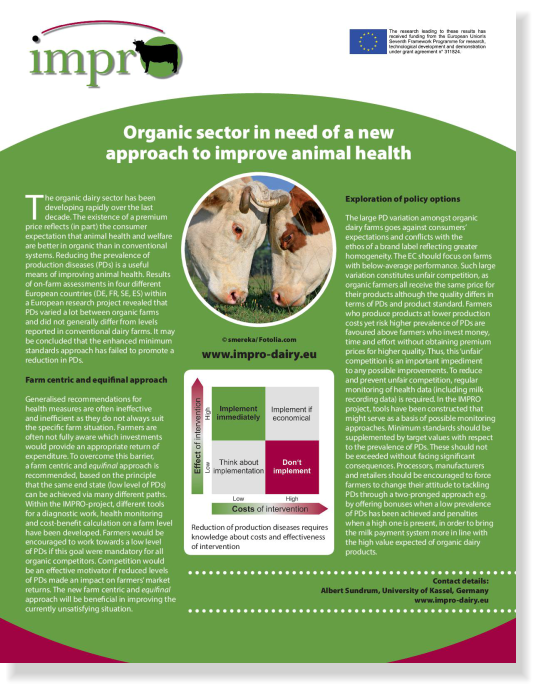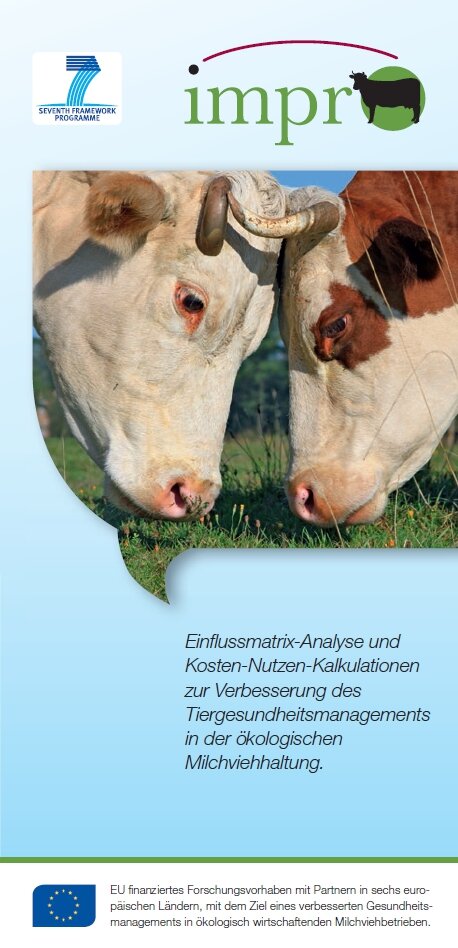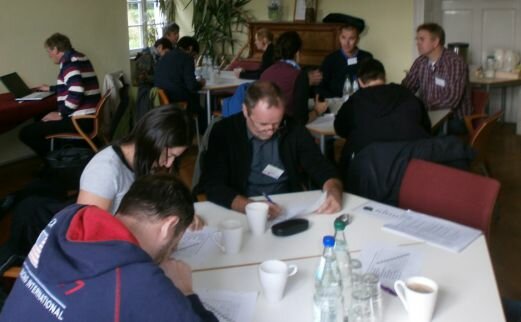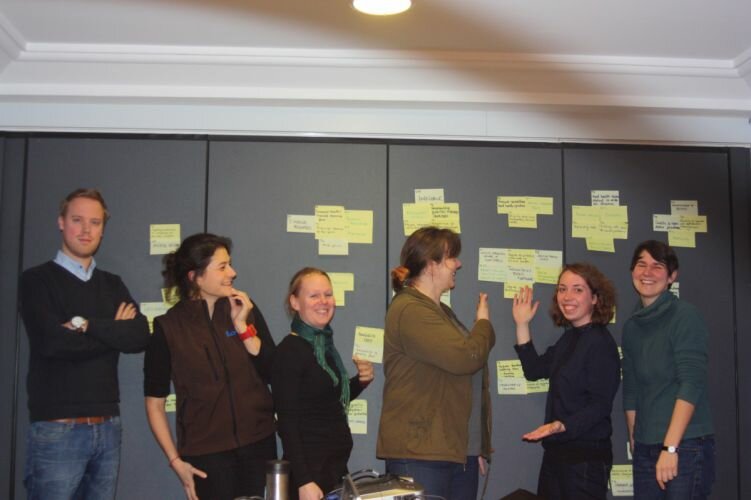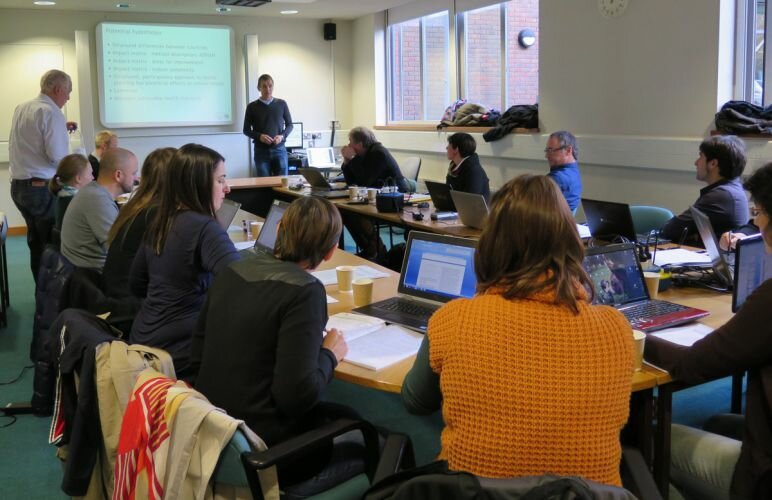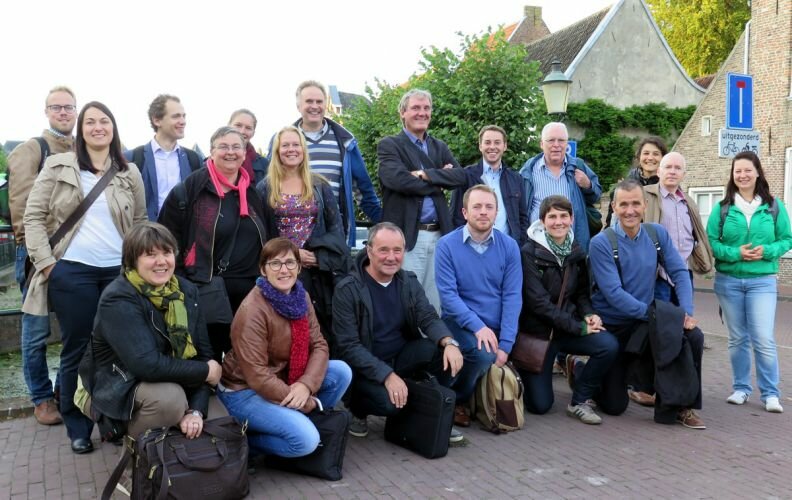Consortium
The IMPRO project brings together a well suited, strong consortium representing a strong and highly ranked group of scientists, capable to deal with the scientific challenges within the IMPRO project.The consortium offers a balanced combination between some of Europe’s leading experts in organic livestock production and in animal health management. The commercial partner DSP is specialised on software applications in dairy production, relying on a long track and experiences especially in the development of software for herd management, advisory service and veterinarians.
- UKS
- SLU
- ONIRIS
- WU
- IRTA
- DSP
- UREAD
University of Kassel, UKS
Department of Animal Health and Animal Nutrition 
Faculty of Organic Agricultural Sciences
Witzenhausen, Germany
Coordinator: Prof. Dr. Albert Sundrum
The Faculty of Organic Agricultural Science at the University of Kassel has a long history in organic agriculture and in the promotion of a system-oriented scientific approach. It is the only agricultural faculty in Europe with the focus on organic agriculture. Research work activities in the Department of Animal Nutrition and Animal Health are focused on on-farm assessment of animal health and welfare in organic dairy and pig production and on the implications of nutrient supply under the framework conditions of organic farming on animal health. The department has laboratory facilities to carry out various analytical methods.
Sveriges Lantbruksuniversitets
Department of Clinical Sciences 
Uppsala, Sweden
Leader: Prof. Dr. Ulf Emanuelson
SLU is a world-class university in the fields of life and environmental sciences. SLU’s sectors encompass the agrarian industry, veterinary medicine, natural resources and the environment, as well as rural development and landscape architecture. In addition to basic research, SLU pursues problem-oriented activities governed by the needs of its sectors, including experimental and developmental operations, information focusing on industry, and government support. The Department of Clinical Sciences belong to the Faculty of Veterinary Medicine and Animal Science at SLU.
The mission of the Department of Clinical Sciences comprises research and research education in medicine, surgery, comparative reproduction, disease diagnostics and epidemiology in various animal populations. This includes validation and use of database information on production, reproduction and disease, and to identify risk factors for productivity, health and welfare. Projects regarding health and productivity in organic dairy herds have been developed. The Department of Clinical Sciences has built a strong interdisciplinary networking with academia and the industry.
Veterinary School of Nantes – ONIRIS
Research Unit Biology, Epidemiology and Risk Analysis in Animal Health - BIOEPAR 
Nantes, France
Leader: Dr. Christine Fourichon
ONIRIS is a national research and higher education organization of the Ministry of Agriculture in France, specialised in veterinary medicine, agri-food chain engineering, and nutrition. Its situation in western France results in a high commitment into research and education in farm animal health and food safety, and active collaboration with industry.
The research group BioEpAR (Biology, Epidemiology and Risk Analysis in Animal Health) is a joint research unit of ONIRIS and INRA (the French research organisation in agricultural sciences). It aims at producing scientific knowledge and methods for the management of animal health and veterinary public health. Research questions are addressed at different levels of integration (animal, herd, farm, and region). The objectives are to identify key-factors of disease occurrence and to assess existing or possible control actions. The disciplines involved are epidemiology, modelling and animal health economics. In dairy herds, multifactorial production diseases and endemic transmissible diseases are addressed. An original framework for R&D projects in the group is supported by the Ministry of Agriculture (“UMT” Cattle Herd Health Control) to define socio-economic partnership with farmers’ organizations, advisors and veterinary practitioners. It aims at jointly defining research targeted to end-users’ needs and at developing practical and innovative tools for dissemination of research results and existing knowledge
Wageningen University
Business Economics
Wageningen, The Netherlands
Leader: Prof. Dr. Henk Hogeveen
WU is a leading institution in the area of life sciences and focuses on education and research in this area. The university offers BSc and MSc programs and currently hosts approximately 6.700 BSc and MSc students. The department of Social Sciences is one of the five departments within WU and Business Economics is one of the chair groups within this department. The Business Economics group holds a strong position in interdisciplinary research with key areas, such as food supply chain economics, bio-economic modelling, and economics of animal health, food safety and plant health. Also, the Business Economics group is active in measuring and modelling performance and risk management of agro-supply chains and farms. The work of the business economics group is characterized by a sound theoretical basis in combination with highly applicable results. Several members of the group have participated or currently participate in large research projects financed by the Dutch Ministry of Agriculture, the Dutch organization for scientific research (NWO) and the European Community as well as in several national research projects. Recently, the group coordinated the EU projects HEALTHY POULTRY and INCOME STABILISATION and was involved in several EU projects, i.e SEAMLESS, CARERA, PRATIQUE and FOODIMA.
Institut de Recerca i Tecnología Agroalimentàries
Department of Animal Nutrition, Welfare and Health 
Monells, Spain
Leader: Dr. Antonio Velarde
IRTA was created as an expression of the will to form an efficient instrument through the policy of stimulus for technological innovation based on scientific advances and to help its operation through economic means. Among its general objectives are to stimulate research and technological development within the agrifood area, to facilitate the transfer of scientific advances and to promote its own technological advances by looking for the maximum co-ordination and collaboration with the public and private sector. IRTA´s activities are concerned with scientific research and technology transfer in the areas of agriculture, aquacultre and the agrifood industry.
The subprogramme Animal welfare study the behaviour and welfare of cattle, pigs and sheep on farm, while in transport and during their slaughter. The transversality of a subject such as animal welfare allows it to be included in different research lines, such as meat and carcass quality, nutrition, genetics, rabbits, ruminants, poultry and aquaculture.
Our lines of work are:
- Animal welfare during slaughter.
- Animal welfare during transport.
- Evaluation of animal welfare in farm and at the abattoir.
- Alternatives to the practice of painful processes.
Data Service Paretz GmbH
Paretz, Germany 
Leader: Jürgen Imker
Data Service Paretz GmbH (DSP) is a German computer retailer, specialised on agricultural applications, with more than 20 years of experience in the development of software for herd management, advisory service and veterinarians. DSP currently has 21 staff including 11 graduates.
The company is a leading producer of practical and straightforward high quality agricultural software in Germany. DSP focuses on software for cattle farming and health management in dairy farms. In the field of dairy herd management solutions, DSP has reached a marked-leading position in Germany. The customers include farmers, veterinarians, hoof trimmers, advisory services and breeding associations. The company currently has five thousand commercial users.
The collaboration with academic research groups is an important part of the company’s strategy. Therefore it cooperates in various research and development projects, such as Portal Page Cattle (2001-2003), Development of a controlling system with an integrated system for quality management for cattle (2004-2007), Development of algorithms and technologies for process control and steering in cattle rearing (2009–2012), Improvement of animal health in dairy farms by electronic supported procedures for health monitoring (2010-2013).
The core competence of DSP is the development of user oriented knowledge-based software solutions for farmers, advisors and veterinarians. By providing clearly structured concepts and modular programming the software development via an iterative process achieves a high level of performance. The integration of economic analysis into herd management software is in the centre of DSP’s interest for future product lines. The inclusion of a participatory consulting approach by an impact matrix represents a challenge that will lead to an innovative product.
University of Reading
School of Agriculture, Policy and Development 
Reading, United Kingdom
Leader: Prof. Richard Tranter
The School of Agriculture, Policy and Development (SAPD) has over 100 years experience in dairy research, and forty five years of researching farmers’ knowledge, attitudes and behaviour and the influence of information, advice and communication on their adoption of new practices. SAPD hosts the Animal Science Research Group, formed in 2004 from a merger of the Nutritional Sciences Research Unit (NSRU), the Centre for Dairy Research (CEDAR) and Biomathematics. SAPD’s Economic and Social Sciences Division conducts research into the factors that influence the behaviour of farmers and other actors within the rural economy, using tools of a range of social science disciplines including economics, sociology, anthropology and social psychology. Social scientists work closely with veterinarians and animal scientists in policy-focused research to inform industry and government decision makers on matters ranging from animal welfare, to regulatory regimes, CAP reform and the design and implementation of the Single Payment.








